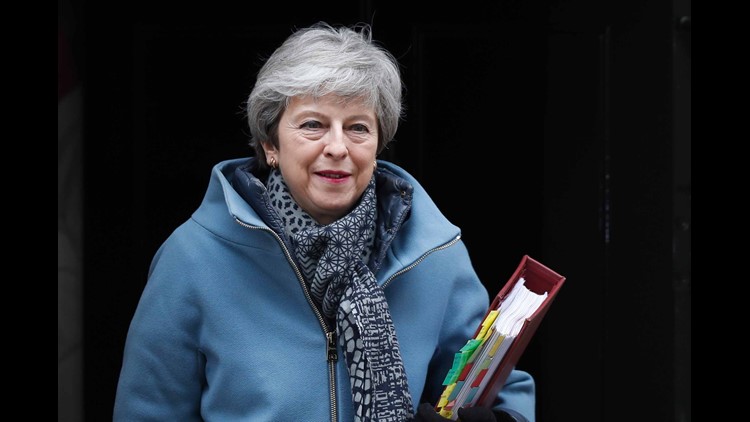(CNN) — UK Prime Minister Theresa May announced her resignation in an emotional speech on Friday, May 24, finally bowing to intense political pressure over the failure to deliver her signature policy — Britain’s withdrawal from the European Union.
Standing at a lectern outside Downing Street on Friday morning, May said she would quit as leader of the Conservative Party on June 7, but would stay on as Prime Minister until a successor is chosen.
May said she had done everything she could to convince Members of Parliament (MPs) to back her thrice-rejected Brexit deal, but acknowledged that she had failed.
“I tried three times. I believe it was right to persevere, even when the odds against success seemed high. But it is now clear to me that it is in the best interests of the country for a new Prime Minister to lead that effort,” she said.
“It is, and will always remain, a matter of deep regret to me that I have not been able to deliver Brexit.”
May said it would be down to her successor to find consensus where she could not, and urged all sides to compromise.
“I will shortly leave the job that it has been the honor of my life to hold — the second female Prime Minister but certainly not the last,” May said.
“I do so with no ill-will, but with enormous and enduring gratitude to have had the opportunity to serve the country I love,” she said, bursting into tears as she left the lectern and walked back into Number 10.
May was forced into making Friday’s announcement after losing the support of her Cabinet, many of whom were fed up with the ongoing turmoil over Brexit.
The last straw for Cabinet ministers appears to have been the latest version of May’s Brexit plan, which she unveiled on Tuesday. In an attempt to win over opposition lawmakers, May offered the House of Commons the chance to vote on a second referendum — a concession that was bitterly opposed by some senior members of her government.
Her fate was sealed by the leadership of the 1922 Committee — which represents the interests of rank-and-file lawmakers in May’s Conservative Party — who threatened to change party rules to allow a vote of no-confidence. May survived an earlier confidence vote in December last year, and under current rules was immune to challenge for another year.
May’s announcement will set off a frantic race to succeed her. One leading candidate is Boris Johnson, the wily former Foreign Secretary who commands significant support among grassroots members of the party.
Johnson has bitterly opposed the withdrawal deal that May negotiated with the EU, and resigned from her Cabinet over it. On Friday, he described May’s statement as “dignified” and said “it is now time to follow her urgings: to come together and deliver Brexit.”
A number of May’s Cabinet members, including potential candidates in the race to replace her, paid their tributes on Twitter.
Amber Rudd, who serves as Work and Pensions Secretary, praised May’s “great courage,” while Home Secretary Sajid Javid said no one had “a greater sense of public duty than the Prime Minister.”
Prominent Brexiteer Andrea Leadsom, who resigned as Leader of the House of Commons on Wednesday, said May’s speech illustrated “her total commitment to country and duty.”
But it’s unclear whether the next Prime Minister will have any luck reopening the deal, which Brussels has insisted is locked down. May’s successor will face the same deadlocked House of Commons, which has repeatedly rejected her plan but failed to vote in favor of any kind of alternative.
That may raise the prospect of a new Conservative leader calling a general election in an attempt to break the impasse.
UK opposition Labour Party leader Jeremy Corbyn jumped at the prospect after May’s speech, tweeting: “Whoever becomes the new Tory leader must let the people decide our country’s future, through an immediate General Election.”
Some pro-Remain politicians expressed concern that a Brexiteer could soon take May’s place and push Britain towards a hard Brexit.
“The prospect of an even more hardline Brexiteer now becoming PM and threatening a no deal exit is deeply concerning,” Scotland’s First Minister Nicola Sturgeon said on Twitter.
May’s decision to step down is an inglorious end for a Prime Minister who was ushered into office on the back of the Brexit vote, promising to deliver on the results of the referendum.
But the deal that resulted from a tortuous set of negotiations with the EU was rejected three times by the House of Commons.
On Tuesday, in an attempt to repackage the plan, May rolled it up into a wider set of legislation dealing with Britain’s departure. As well as the offer of a second referendum, it also contained pledges on workers’ rights, environmental provisions, as well as a temporary customs relationship with the European Union.
But her “new Brexit deal” was greeted with significant opposition from across the political spectrum. Hardline Conservatives who had supported May’s last deal, Democratic Unionist Party (DUP) MPs who prop up May’s minority government in Parliament and supporters of a second referendum alike all rejected it.



